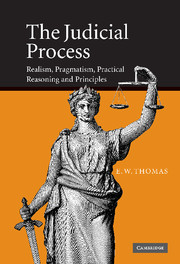Book contents
- Frontmatter
- Contents
- Preface
- 1 Introduction
- 2 Muddling along
- 3 The ‘curse’ of formalism
- 4 Legal fundamentalism
- 5 The idolatry of certainty
- 6 The piety of precedent
- 7 The foibles of precedent – a case study
- 8 There is no impersonal law
- 9 So, what is the law?
- 10 The constraints on the judiciary
- 11 Towards a new judicial methodology
- 12 Of realism and pragmatism
- 13 Of … practical reasoning and principles
- 14 Taking law seriously
- 15 A theory of ameliorative justice
- Subject index
- Authors index
4 - Legal fundamentalism
Published online by Cambridge University Press: 15 July 2009
- Frontmatter
- Contents
- Preface
- 1 Introduction
- 2 Muddling along
- 3 The ‘curse’ of formalism
- 4 Legal fundamentalism
- 5 The idolatry of certainty
- 6 The piety of precedent
- 7 The foibles of precedent – a case study
- 8 There is no impersonal law
- 9 So, what is the law?
- 10 The constraints on the judiciary
- 11 Towards a new judicial methodology
- 12 Of realism and pragmatism
- 13 Of … practical reasoning and principles
- 14 Taking law seriously
- 15 A theory of ameliorative justice
- Subject index
- Authors index
Summary
Legal fundamentalism
From time to time I have used the expression ‘legal fundamentalists’. They are an extreme lot. Notwithstanding determined self-discipline and the most demanding editing, the phrase has survived all attempts to eliminate it from the text of this book. Persisting with its use reflects the experience or, perhaps, the suffering, of those judges who have sought to bring a viable law into the twenty-first century. They have been met with a brand of legal populism that seeks to deny judges the capacity for choice in administering the law and daunts the judicial instinct to do justice and shape the law to fit the needs of the times. Legal fundamentalism seeks to arrest the common law's essential dynamic. It is this hostile influence on the administration and development of the law that justifies separate reference to the topic. There can be no place for legal fundamentalism in a modern judicial methodology.
Legal fundamentalism encompasses a mode of thought that is essentially simplistic and incomplete. It is best understood as the legal equivalent of religious fundamentalism, being similarly dedicated to the strict maintenance of traditional and historical doctrines and characterised by the extremeness of the positions that are adopted and the evangelical fervency and frequency with which they are expressed. Hence, for example, legal fundamentalists tend to viscerally recoil from anything approaching modernity in the law; are committed to a rigid rule-bound approach and a strict application of the doctrines of precedent and stare decisis; have never perceived or accepted the extent of uncertainty in the law, nor fully adjusted to the inevitability of judges making law; believe in the strict separation of powers and the singular omniscience of Parliament; and are vociferously hostile to anything remotely bordering on judicial creativity.
- Type
- Chapter
- Information
- The Judicial ProcessRealism, Pragmatism, Practical Reasoning and Principles, pp. 75 - 107Publisher: Cambridge University PressPrint publication year: 2005
- 1
- Cited by



